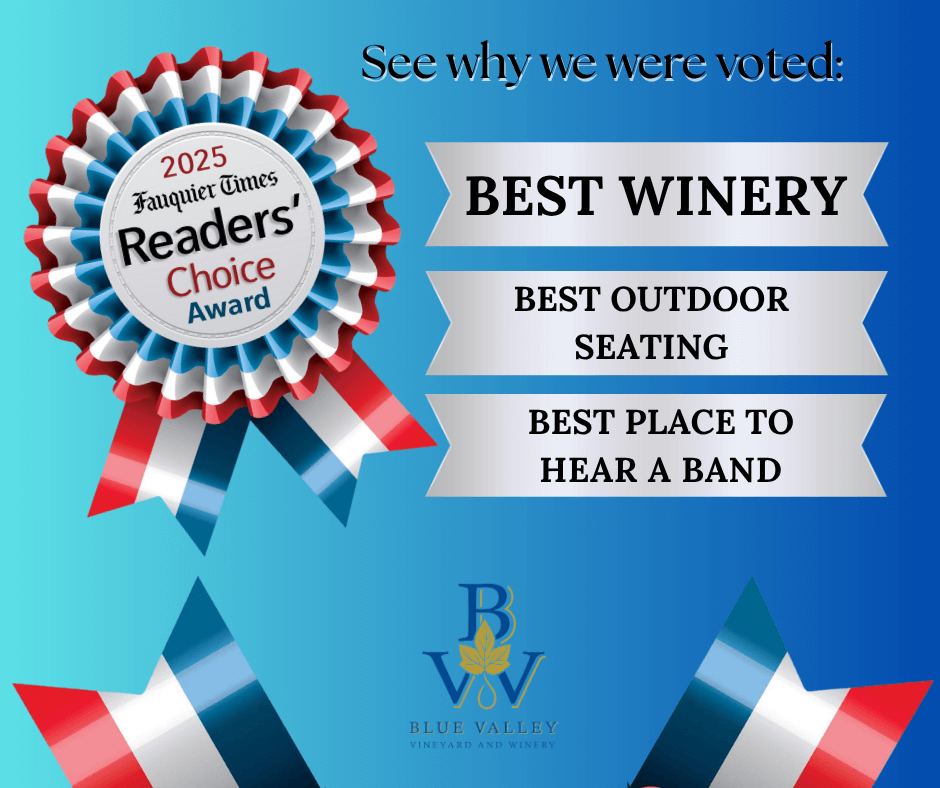When it comes to wine production, many people often focus on the grapes, vineyard location, and the wine making process. However, what often goes unnoticed is the importance of sustainable viticulture. Sustainable viticulture means utilizing farming practices that protect the environment, preserve natural resources, and support economic viability. Blue Valley Vineyards in Fauquier County, VA, is committed to sustainability in every aspect of its wine production. In this blog, we will delve into Blue Valley’s dedication to sustainable viticulture and how it enhances the wine and the land.
Blue Valley Vineyards’ commitment to sustainable viticulture starts with the selection of grape varieties that are best suited for Virginia’s climate and soil. The vineyard uses a technique called integrated pest management (IPM), which is an environmentally friendly pest control method that minimizes the use of pesticides. They also take a soil-centric approach, which means improving soil health and fertility through natural fertilization, cover cropping and minimal tillage. These practices help to reduce pollution and soil erosion while also improving the quality of the grapes and resulting wine.
In addition to their vineyard and winemaking practices, Blue Valley Vineyards strives to reduce their environmental impact in every aspect of their business. For example, they use solar power for their electricity needs, utilize recycled materials in their wine bottle production, and operate a biodiesel-fueled tractor. Blue Valley also partners with as many local businesses as possible to support the local community and reduce transportation-related emissions.
Visitors to Blue Valley Vineyards will also notice their commitment to sustainability through the architecture. The tasting room is built with reclaimed wood from local farms and mills, and large windows provide natural light and passive solar heating. Guests can also enjoy outdoor seating on the patio made from locally sourced stone, which not only enhances the vineyard’s aesthetic but also reduces the carbon footprint of transportation.
The sustainable practices implemented at Blue Valley Vineyards not only protect the environment but also contribute to the unique flavors of their wine. By promoting healthy soil, controlling pests without pesticides, using renewable energy sources, and sourcing materials locally, Blue Valley Vineyards can create high-quality, distinctive wines with a strong sense of locality and agriculture. This approach has earned them recognition for both their sustainability practices and memorable wines.
12 Ways Blue Valley Vineyards Enhances Our Land and Wine
Wine enthusiasts know that wine tastes better when it has been made sustainably, with care for the land, environment, and local economy. Blue Valley Vineyards in Fauquier County, Virginia, is a prime example of sustainable viticulture done right. But what does “sustainable” mean in the wine world, and how does it affect the result? We have gathered twelve ways that Blue Valley Vineyards are making a difference through sustainable practices that enhance both the wine and the land.
Natural pest management: Blue Valley uses natural predators and deterrents such as beneficial insects, owls, and bats to control pests and minimize the use of pesticides.
Composting: The winery composts grape waste, manure, and other organic materials to enrich the soil and reduce waste.
Minimal tillage: Blue Valley’s vineyards are planted on slopes that naturally aerate the soil, reducing the need for mechanical tillage and preserving the soil structure.
Carbon sequestration: The soil and vines at Blue Valley sequester carbon, helping to reduce greenhouse gases in the atmosphere.
Biodiversity: The winery preserves the natural landscape by protecting native plants and animals, and planting cover crops and hedgerows that provide habitat for beneficial wildlife.
Recycling: Blue Valley recycles all plastic, glass, cardboard, and other materials used in the wine-making process.
Local sourcing: The winery sources supplies and services from local businesses whenever possible, supporting the local economy.
Reduced packaging: Blue Valley uses lightweight wine bottles made with recycled glass and uses minimal packaging materials to reduce waste.
Food waste reduction: Blue Valley has donated leftover food from events and the tasting room to local food banks and charities.
Cultural heritage preservation: The winery is committed to preserving the historic and cultural heritage of the area, including the civil war-era property and its original stone barn.
Eco-tourism: Blue Valley encourages and educates visitors on sustainable practices and offers environmentally conscious tours and events.
Quality wine: Most importantly, sustainable practices lead to high-quality wine that reflects the unique terroir of Fauquier County. Blue Valley’s wines are handcrafted in small batches, using sustainable practices that enhance the flavor, aroma, and texture of each varietal.
Conclusion:
Sustainable viticulture is not just a buzzword; it is a way of life that benefits everyone involved in the wine-making process. Blue Valley Vineyards is a shining example of how sustainable practices can enhance the land, environment, and local economy, while also producing exceptional wine Blue Valley is at the forefront of sustainable viticulture with their commitment to using natural farming practices, reducing their environmental impact, utilizing locally sourced materials, and producing wine that is reflective of the land. When you visit Blue Valley Vineyards, not only will you enjoy the taste of unique, locally made wines, but also have the knowledge that the sustainable practices you see in action protect the environment and support the local community.
You will be supporting a winery that cares about the land and the people who enjoy its bounty.

